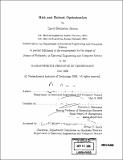Risk and robust optimization
Author(s)
Brown, David Benjamin, Ph. D. Massachusetts Institute of Technology
DownloadFull printable version (12.32Mb)
Other Contributors
Massachusetts Institute of Technology. Dept. of Electrical Engineering and Computer Science.
Advisor
Dimitris J. Bertsimas.
Terms of use
Metadata
Show full item recordAbstract
This thesis develops and explores the connections between risk theory and robust optimization. Specifically, we show that there is a one-to-one correspondence between a class of risk measures known as coherent risk measures and uncertainty sets in robust optimization. An important consequence of this is that one may construct uncertainty sets, which are the critical primitives of robust optimization, using decision-maker risk preferences. In addition, we show some results on the geometry of such uncertainty sets. We also consider a more general class of risk measures known as convex risk measures, and show that these risk measures lead to a more flexible approach to robust optimization. In particular, these models allow one to specify not only the values of the uncertain parameters for which feasibility should be ensured, but also the degree of feasibility. We show that traditional, robust optimization models are a special case of this framework. As a result, this framework implies a family of probability guarantees on infeasibility at different levels, as opposed to standard, robust approaches which generally imply a single guarantee. (cont.) Furthermore, we illustrate the performance of these risk measures on a real-world portfolio optimization application and show promising results that our methodology can, in some cases, yield significant improvements in downside risk protection at little or no expense in expected performance over traditional methods. While we develop this framework for tile case of linear optimization under uncertainty, we show how to extend the results to optimization over more general cones. Moreover, our methodology is scenario-based, and( we prove a new rate of convergence result on a specific class of convex risk measures. Finally, we consider a multi-stage problem under uncertainty, specifically optimization of quadratic functions over un-certain linear systems. Although the theory of risk measures is still undeveloped with respect to dynamic optimization problems. we show that a set-based model of uncertainty yields a tractable approach to this problem in the presence of constraints. Moreover, we are able to derive a near-closed form solution for this approach and prove new probability guarantees on its resulting performance.
Description
Thesis (Ph. D.)--Massachusetts Institute of Technology, Dept. of Electrical Engineering and Computer Science, 2006. Includes bibliographical references (p. 203-213).
Date issued
2006Department
Massachusetts Institute of Technology. Department of Electrical Engineering and Computer SciencePublisher
Massachusetts Institute of Technology
Keywords
Electrical Engineering and Computer Science.